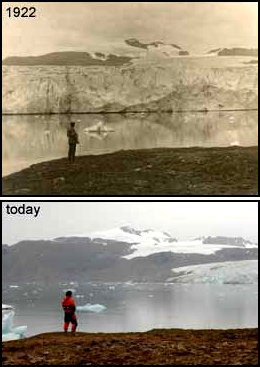
And you thought Stephen Colbert was telling a joke when he said,
[Interviewing Jesse Jackson is] like boxing a glacier. Enjoy that metaphor, by the way, because your grandchildren will have no idea what a glacier is.
To all the people who say, well, global warming isn't going to happen in my lifetime, better think again. Scientists at the US National Snow and Ice Data Centre say the Arctic Glaciers could be gone by 2030, and gone in the summers by 2016. Time to pull our collective heads out of the sand, before there's nothing but sand left.
The Guardian (uk): Meltdown fear as Arctic ice cover falls to record winter low
Record amounts of the Arctic ocean failed to freeze during the recent winter, new figures show, spelling disaster for wildlife and strengthening concerns that the region is locked into a destructive cycle of irreversible climate change.
Satellite measurements show the area covered by Arctic winter sea ice reached an all-time low in March, down some 300,000 square kilometres on last year -an area bigger than the UK.
Scientists say the decline highlights an alarming new trend, with recovery of the ice in winter no longer sufficient to compensate for increased melting in the summer. If the cycle continues, the Arctic ocean could lose all of its ice much earlier than expected, possibly by 2030.
Walt Meier, a researcher at the US National Snow and Ice Data Centre in Colorado, which collected the figures, said: "It's a pretty stark drop. In the winter the ice tends to be pretty stable, so the last three years, with this steady decline, really stick out."
Experts are worried because a long-term slow decline of ice around the north pole seems to have sharply accelerated since 2003, raising fears that the region may have passed one of the "tipping points" in global warming. In this scenario, warmer weather melts ice and drives temperatures higher because the dark water beneath absorbs more of the sun's radiation. This could make global warming quickly run out of control.
Dr Meier said there was "a good chance" the Arctic tipping point has been reached. "People have tried to think of ways we could get back to where we were. We keep going further and further into the hole, and it's getting harder and harder to get out of it."
The Arctic is rapidly becoming the clearest demonstration of the effects of mankind's impact on the global climate. The temperature is rising twice as fast as the rest of the planet and the region is expected to warm by a further 4C-7C by 2100. The summer and winter ice levels are the lowest since satellite monitoring began in 1979, and almost certainly the lowest since local people began keeping records around 1900. The pace of decline since 2003, if continued, would see the Arctic totally ice-free in summer within 30 years - though few scientists would stake their reputations on a long-term trend drawn from only three years.
Experts at the US Naval Postgraduate School in California think the situation could be even worse. They are about to publish the results of computer simulations that show the current rate of melting, combined with increased access for warmer Pacific water, could make the summertime Arctic ice-free within a decade. Dr Meier said: "For 800,000 to a million years, at least some of the Arctic has been covered by ice throughout the year. That's an indication that, if we are heading for an ice-free Arctic, it's a really dramatic change and something that is unprecedented almost within the entire record of human species."
The winter ice has declined all around the region - bad news for polar bears, which spend summer on land before returning to the ice in spring to catch food.






No comments:
Post a Comment